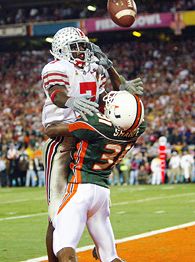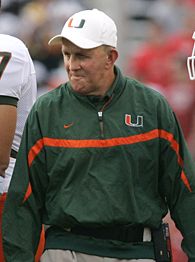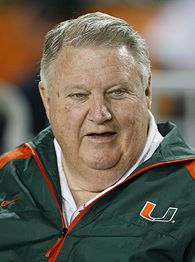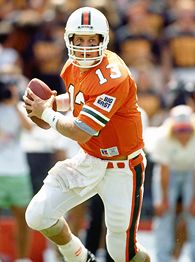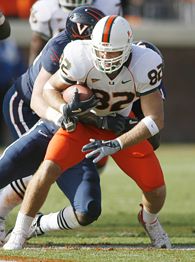Coker focus of criticism for Canes' collapse
CORAL GABLES, Fla. -- Miami cornerback Glenn Sharpe still remembers the play like it happened yesterday. Only a freshman, Sharpe was thrust into the final minutes of a thrilling game against Ohio State in the 2003 Fiesta Bowl, in which the No. 1 Hurricanes were trying to extend their 34-game winning streak and win a second straight national championship.
Miami led 24-17 in the first overtime, and the Buckeyes faced fourth-and-3 at the Hurricanes' 5. Ohio State quarterback Craig Krenzel threw into the right corner of the end zone for Chris Gamble, but Sharpe broke up the pass as the receiver reached back for the football. Miami's players and coaches ran on the field to celebrate what they thought was the school's sixth national championship.
Jamie Squire/Getty Images
Miami hasn't returned to the title game since an interference call against Glenn Sharpe (31) helped end its run in 2002.
But then field judge Terry Porter threw a flag well after Krenzel's incomplete pass hit the turf, and Sharpe was penalized for pass interference. It took officials several minutes to restore order and get the Hurricanes off the field. Three plays later, Krenzel dove into the end zone to send the game into a second overtime, in which the Buckeyes won 31-24.
In the ensuing four years, that game has proved to be more than a gut-wrenching loss for the Hurricanes. It also marked the beginning of the end of a college football dynasty. Miami played for at least a share of the national championship 10 times in 20 seasons from 1983 to 2002, winning five titles. During that span, the Hurricanes produced more NFL draft choices than any other program in the country and littered the pros with future Hall of Fame players.
"I wouldn't have pictured we'd be struggling like this," said Sharpe, now a junior starter after missing each of the previous two seasons with knee injuries. "We were a program that was doing very well and had won a national championship the year before. I wouldn't have imagined we'd be struggling like this."
Miami went 11-2 the season after losing to Ohio State in the Fiesta Bowl, but the program has been in a downward spiral since then. Here's how far the Hurricanes have fallen during the last three seasons: After winning their first 24 games under coach Larry Coker, they've lost 12 of their last 35 games, or roughly once every three times they've taken the field.
The Hurricanes finished 9-3 in 2004 and 2005 and are 5-6 this year going into Thursday night's finale against Boston College at the Orange Bowl, a game Miami must win to become eligible to play in a postseason bowl game.
"It's unfortunate," Sharpe said. "We just haven't gotten it done. I don't blame anyone. We're all in this together."
Despite numerous successes on and off the field during his tenure, Coker, who was elevated from offensive coordinator to head coach when Butch Davis bolted for the NFL after the 2000 season, has been the primary target for criticism.
Chris Gardner/AP Photo
A 5-6 record in 2006 has Larry Coker at the center of the storm in Miami.
Coker has won more games in his first six seasons than any other Hurricanes coach except Dennis Erickson. He has won more games since 2001 than all but five Division I-A coaches. Coker has a 58-15 record and a winning percentage of nearly 80 percent. He has won a national championship and played for another.
Coker's teams are 4-2 against rival Florida State, 3-0 against Florida and have won two BCS bowl games, including a 37-14 victory over Nebraska in the 2002 Rose Bowl, which gave the Hurricanes their fifth national title.
Players' performances in the classroom have also improved under Coker. Miami graduated 53 percent of its players who entered school during 1993-97, which was the end of Erickson's tenure and the start of the Davis era. According to the most recent statistics released by the NCAA, Miami graduated 68 percent of its football players who entered the school during 1996-99, compared to a 71 percent success rate for the overall student body. It should be noted that those players were among the recruiting classes signed during Davis' six-year tenure at Miami, but Coker and his assistants were charged with keeping those players on track to graduate.
"I'm proud of what we've done here," Coker told reporters in Miami on Monday. "I don't know how that's perceived around the country or whatever. There's not a hint of an NCAA investigation. We graduate our players more now than they ever have at this university. ? And I know how hard we've worked."
However, Miami's declining trend on the field over the past two seasons has alarmed the fan base, former players and some members of the administration.
Before the Hurricanes lost their fourth straight game Saturday at Virginia, a Miami trustee who spoke on the condition of anonymity said there was a "50/50" chance Coker would be retained as the school's football coach after this season. The trustee said Miami president Donna Shalala and athletic director Paul Dee don't want to fire Coker, who is well-liked by the team's players, faculty and many influential boosters and alumni.
"The question is are Donna and Paul going to give Larry another year to turn the program around or not?" the UM trustee said. "I'm sure there are some of us out there that would like to see him stay and others of us who would like to see us cut our losses and give someone else a chance.
"I think it's 50/50. I suspect after the [Maryland] game, I think the heat was off him a little bit because he got the team to play so hard. We'll have to see what happens the rest of the way."
Dee said he and Shalala will evaluate Coker's future at the school after the Hurricanes play Boston College.
Joel Auerbach/US Presswire
Miami athletic director Paul Dee will evaluate Coker after the season.
"The coach is [58-15]," Dee said last week, before Saturday's loss. "He won the national championship and played for the national championship the second year. We played in a BCS bowl the third year and beat Florida State in the bowl game. He won nine games in the fourth year and beat Florida in a bowl game. I think when you look at it, there's been more success than failure.
"Some people say direction is the important thing and they might be right. We need to look at everything. This season has been very, very difficult. It's something that's going to be looked at."
Coker's job security has been the subject of rampant speculation for weeks. Rutgers coach Greg Schiano, a former Miami defensive coordinator, and Barry Alvarez, the Wisconsin athletic director who was hired as the Badgers' football coach when Shalala was chancellor there, have been mentioned among the possible candidates to replace Coker, if he's fired. South Carolina coach Steve Spurrier and Auburn coach Tommy Tuberville have also been mentioned, but both have denied interest.
"This is a great place to live. It's a great job," Coker told reporters Monday. "And I'm the football coach here. I want to be here for a long time. Who knows? Who knows? There's rumors out there, speculation out there, but it's not going to be done by certain fans, it's not going to be done by the media, it's going to be done by the proper people in charge."
Shalala, who was the U.S. secretary for health and human services under former President Bill Clinton, will ultimately make the decision as to whether Coker is retained as coach, according to several people familiar with the situation. Dee, who has worked as Miami's athletic director since 1993 and hired Coker to replace Davis, will also have input in the decision, the Miami officials said.
The UM trustee said Miami's athletic department was in good enough financial position to fire Coker and pay him a buyout of close to $3 million. Coker, 58, has three years left on a contract that was extended five years in September 2005 and pays him approximately $2 million annually. But the trustee said he believed paying Coker to leave was "wasteful."
"I think the university is financially able to do whatever it wants," the UM trustee said. "It's not a matter of ability, it's a matter of priorities. Personally, I think it would be a waste financially."
However, Miami's athletic department has been under financial strain since leaving the Big East for the ACC prior to the 2004 season. The Hurricanes had to pay the Big East a $1 million exit fee, in addition to an undisclosed amount as part of the settlement for a lawsuit filed by four Big East schools that were left behind in conference realignment. Miami also had to pay a $2 million entry fee to the ACC.
Additionally, Miami had to pay former basketball coach Perry Clark close to $2.5 million when he was fired in March 2004 as a buyout for the last three years of his seven-year contract. In addition, former women's basketball coach Ferne Labati filed an age and gender discrimination lawsuit against Miami when she was fired in March 2005 after consecutive losing seasons. Labati won more than 300 games in 17 seasons at Miami. The lawsuit is pending.
The athletic department's financial constraints leave some former players and boosters wondering whether Miami is really in position to fire Coker and go after an established coach, which might cost several million dollars in a buyout of that coach's current contract, in addition to an annual salary that might be higher than what Coker is being paid.
"If it's 50/50 that Coker stays, then it's a money issue," said a former Miami player, who spoke on the condition of anonymity.
Miami officials say Shalala and Dee are hesitant to fire Coker because of the way he handled the team following the Nov. 7 murder of Bryan Pata, a popular defensive lineman on the team. Pata, a senior who grew up in Miami and was considered a potential NFL draft choice next spring, was shot and killed in the parking lot outside his apartment in Kendall, Fla. Police still haven't identified a suspect or motive.
AP Photo/J. Pat Carter
Larry Coker and the Canes have struggled to deal with the loss of Bryan Pata.
The Hurricanes played at Maryland only four days after Pata's murder and lost 14-13. They returned to Miami later that night, attended Pata's funeral the following Tuesday and an on-campus memorial service Wednesday. Then they played at Virginia three days later.
"It's been tough on me, but it's been tougher on the players," Coker said of Pata's death. "I'm a little bit older and understand life and death."
One Miami trustee said Coker shouldn't be penalized for the team's last two losses because the team was so overwhelmed with grief following Pata's death.
"How are we judging Larry Coker?" asked Don Bailey Jr., the Hurricanes' radio analyst and a former UM lineman from 1979 through '82. "If you're judging Larry Coker on how things have been handled off the field, especially after what's happened the last couple of weeks, you'd give him a lifelong contract."
Miami officials say Coker is well-liked on campus because he had helped clean up the program's sullied image. In fact, only two Miami players have been arrested in Coker's six seasons, a number that is shockingly small for a program that has a renegade reputation. However, the Hurricanes' ugly brawl against Florida International on Oct. 14 didn't help his cause.
"He's a straight-arrow guy, and I think he demands that of his players," the UM trustee said. "I don't think they're a bunch of thugs. I think we've got a bunch of great kids. But you never know what's going to happen between the ears of a high-testosterone, 20-year-old kid, which is where the fight came from."
The fight occurred during the third quarter of the Hurricanes' 35-0 win over FIU, a fledgling football program from a commuter school about nine miles from the Miami campus. After the Hurricanes went ahead 14-0 early in the second half, Miami receiver James Bryant pointed at the FIU bench and bowed to the crowd after catching a touchdown pass. Then a Golden Panthers player wrestled holder Matt Perrelli to the ground on the point-after kick, and another FIU player kicked Perrelli in the helmet and both benches cleared.
It took coaches and police several minutes to break up the ugly melee. Hurricanes safety Brandon Meriweather stomped on an FIU player, and safety Anthony Reddick slammed his helmet into a Golden Panthers player. An injured FIU player was seen swinging his crutch at Miami players.
"It was horrible, a complete embarrassment," Florida Gov. Jeb Bush said, shortly after the fight.
Miami suspended 12 players for one game -- the Hurricanes barely beat winless Duke 20-15 the following week without them -- and Reddick was suspended four games and wasn't reinstated to the team until Saturday's game at Virginia.
Some newspaper columnists and radio talk show hosts called for Coker's immediate dismissal, suggesting he had lost control of his team. It was the second such incident involving Hurricanes players in seven games. Several Miami players fought with LSU players following the Tigers' 40-3 win in the Chick-fil-A Peach Bowl in Atlanta's Georgia Dome at the end of last season.
[FONT=Arial,Helvetica,sans-serif]
Factors In The Fall[/FONT]
Recruiting
Coker's critics claim he benefited from having the players Davis recruited to Miami -- NFL stars such as Dan Morgan, Santana Moss, Bryant McKinnie, Ed Reed, Jeremy Shockey and Reggie Wayne -- when he won the national title in his first season. The last three seasons, critics claim, are a more suitable evaluation of Coker's program because those teams consisted mostly of players he and his assistant coaches recruited to Miami.
One former Miami assistant, now coaching at another BCS conference school, suggested Miami's increased admissions standards have hindered the Hurricanes' ability to sign top-level recruits. The coach said Coker and his staff have recruited more players nationally, and have strayed away from the fertile recruiting grounds of South Florida.
US PRESSWIRE
Former Miami Heisman winner Gino Torretta thinks the Canes' talent level has dropped.
Former Miami quarterback Gino Torretta, who led the Hurricanes to the 1991 national title and won the 1992 Heisman Trophy, questions whether Coker and his staff have worked hard enough in recruiting to replace the talented players the program has lost.
"It's hard to stay at that level," Torretta said. "I think the amount of talent on the 2001 and 2002 teams was probably unprecedented. I know a lot of kids left early and it just shows how hard you've got to work in recruiting. There have been some recruiting mistakes. I think the most glaring mistake is only having four receivers on this team. I know when I was there, we couldn't run our offense with only four receivers.
"I think it's a tough job. Everybody in Miami expects a lot. Former players and everybody else are disappointed because they've been on a downward spiral and are losing games. I know you're not going to sustain a level of having guys like Andre Johnson and Roscoe Parrish at receiver, and Kellen Winslow and Jeremy Shockey at tight end, and Vince Wilfork and Jonathan Vilma and Ed Reed and all those guys on defense. I understand you're not going to have that. But I think there's been such a drop-off in talent."
The Hurricanes' 2006 recruiting class of 20 players included 12 prospects from Florida, seven from the metropolitan Miami area, and eight prospects from states such as Alaska, California, Louisiana, Tennessee, Texas, Virginia and even the Bahamas. The class wasn't ranked among the top 10 nationally by most recruiting services.
"I think the recruiting has been better, in my opinion, than what most people have given them credit for," said Tom Luginbill, national director of recruiting for Scouts Inc. "I think where they've made some recruiting errors was at the quarterback position. If you look at their championship teams, they always had a guy at the position who made plays to win games. They've always had a guy that if all hell was breaking loose, he would make something happen to win the game. They haven't had that the last couple of years."
Miami junior Kyle Wright was widely regarded as the country's top prep quarterback in 2003 after his senior season at Monte Vista High School in Danville, Calif. But Wright, who has been sidelined with a season-ending thumb injury the last two games, has largely struggled in two seasons as a starter, completing 59.6 percent of his passes with 26 touchdowns and 17 interceptions. Sophomore Kirby Freeman started at quarterback the last two games.
Early departures to the NFL
A plethora of early defections to the NFL also has impacted the Canes. From 2001 to 2004, Miami had an unprecedented 19 first-round draft picks in a four-year span. Of the Hurricanes' NFL record six first-round draft choices in 2004, three were underclassmen: Winslow, Wilfork and safety Sean Taylor. Parrish and running back Frank Gore left Miami after their junior seasons the following year, and cornerback/kick returner Devin Hester did the same after last season.
"What has happened from that championship game until now?" Bailey asked. "From 1979 to 2000, Miami was a program that had a lot of very good and some great players who wanted to play college football. I think in 2001, it turned into a farm system for the NFL. I think if you look around college football, how does Wake Forest go into Doak Campbell Stadium and shut out Florida State? They've got experienced football players. We've got a good nucleus of young players right now. If Miami shares were for sale, I'd be buying it. Everybody wants to write it off, but with that freshman class and 19 kids coming back who will start next year, I'd be buying Miami right now."
[FONT=Arial,Helvetica,sans-serif]
What's next for the Canes?[/FONT]
Tight end Greg Olsen, perhaps one of only two Miami players who will be considered for All-ACC honors, along with sophomore defensive end Calais Campbell, said the Hurricanes are still capable of winning championships in the future.
JC Ridley/WireImage.com
Greg Olsen expects the Canes to get back in the running for championships.
"I don't think anyone would have expected this, but it's not the first program that's had a tough year," Olsen said. "Look at a couple of teams that were in the national championship race until a couple of weeks ago. All of a sudden they got new players? No. They didn't get new coaches. It's just the way college football is now. Tennessee didn't go to a bowl game last year. All of a sudden they're not a good program? No. They have one tough year and they fall off the map? No."
But as the Hurricanes prepare for their finale against Boston College and try to preserve their streak of nine consecutive bowl appearances, the controversy surrounding Coker has only intensified. A group of Miami alumni and fans, who assemble on the Web site CanesOverHere.com, paid for anti-Coker banners to fly over the Orange Bowl games in September, then paid for an advertisement in Monday's edition of the Miami Herald.
In the ad, the group criticized Coker's recent track record of no ACC championships in three seasons in the league, a 13-9 record in league games (before the loss at Virginia), and "an offense that's, well, offensive."
"It's been frustrating," said aptly named Miami graduate Randy Banner of Charlotte, N.C., who organized the movement to purchase the anti-Coker banners and newspaper ad. "I haven't wanted the program to decline, but it's been very easy to anticipate. People that defend Coker said he started with the best team and there was no where to go but down. [USC coach] Pete Carroll had the best team and won a second national championship and played for a third. It's not understandable to drive a program into the ground after you've won a national championship.
"By all accounts, Larry Coker is a pleasant guy and he has moral standards. But there are a lot of guys who are nice guys and most of them are better football coaches than Larry Coker."
Bailey, who will be in the Orange Bowl radio booth on Thanksgiving night, only hopes Miami's administration remembers the good things Coker has accomplished.
"I'm not telling you Larry Coker hasn't made mistakes and he can't get better," Bailey said. "But before everybody wants to tighten the noose around his neck, I think they need to consider the number of players who have left Miami early in the last few years. The thing people forget about when you lose kids to the NFL is the leadership you lose.
"People down here, I don't know if they're spoiled or don't appreciate what they have. I saw them try to run Don Shula out of town. I don't know what people are thinking around here. He hasn't done anything to be treated in a bad way, especially after everything he has done the last couple of weeks."
Mark Schlabach covers college football and men's college basketball for ESPN.com. You can contact him at [email protected].




